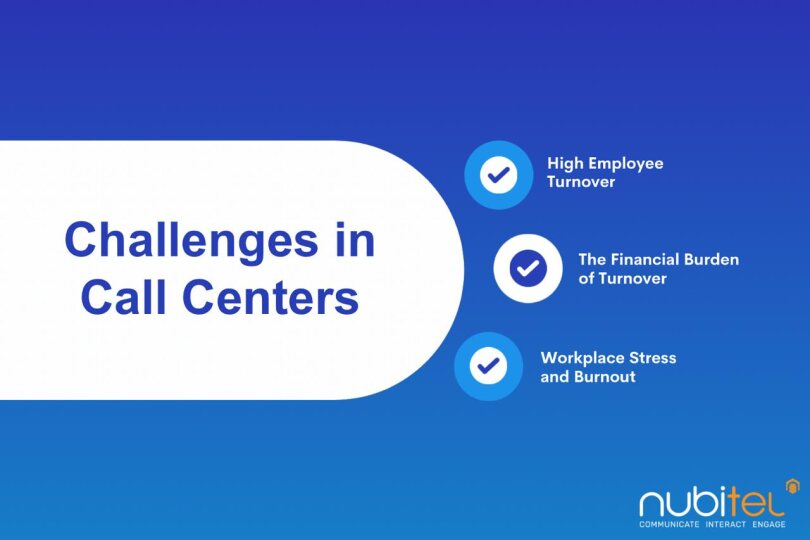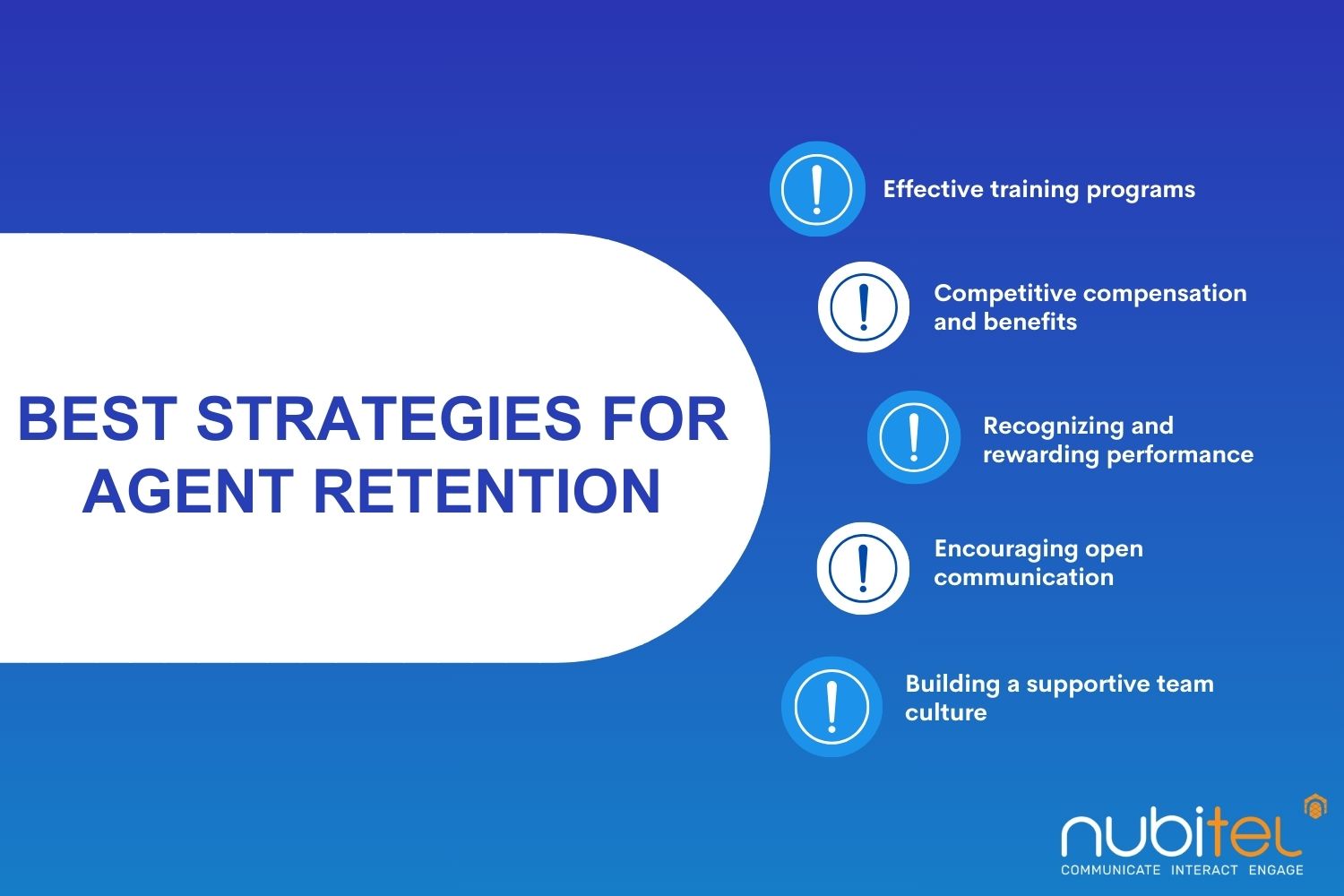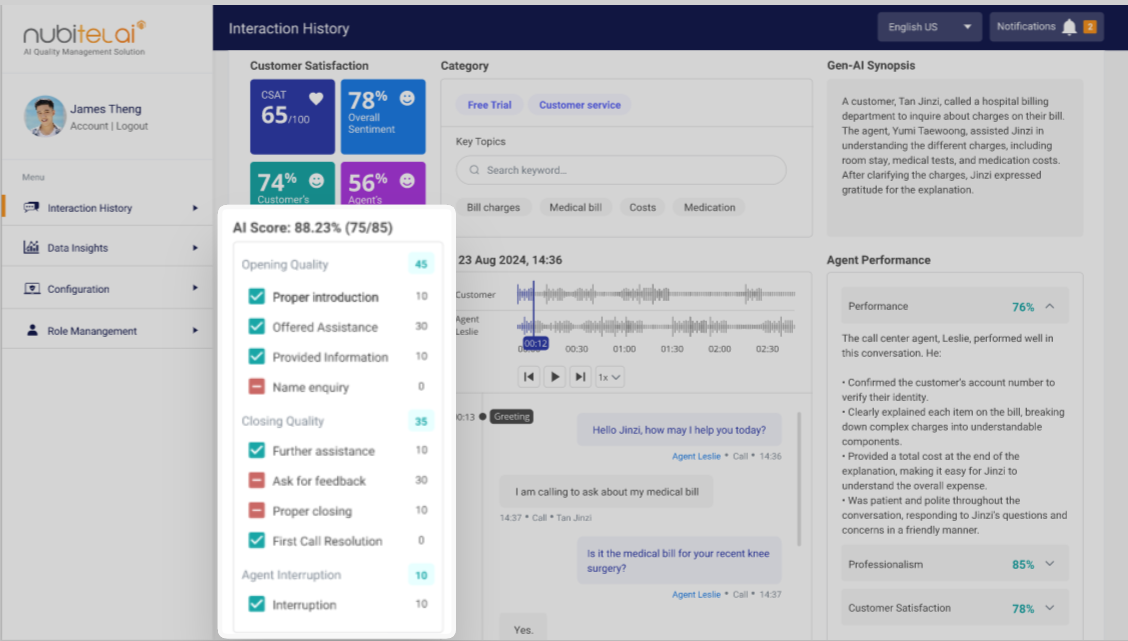A call center guide to agent retention is essential in today’s competitive market, where only one in three customer service representatives remains fully engaged in their roles. Disengaged agents are 84% more likely to seek other job opportunities, and replacing them costs an average of $14,113 per agent.
With these high costs in mind, it’s crucial for call centers to adopt strategies that not only attract the right talent but also foster long-term engagement. This article explores the key challenges call centers face and actionable strategies to enhance agent retention.
Table of Contents
ToggleUnderstanding Agent Retention in Call Centers
Agent retention is a critical metric for call centers, reflecting the organization’s ability to maintain its customer service representatives over time. High turnover rates can lead to increased recruitment, onboarding, and training costs, as well as a decline in service quality due to the loss of experienced staff.
Conversely, prioritizing retention fosters a more experienced, productive, and motivated workforce, resulting in a consistent customer service experience and enhanced business performance.
Challenges in Call Centers
Call centers operate in a high-pressure, fast-paced environment, where various challenges can significantly impact operational efficiency, employee retention, and service quality. Effectively addressing these challenges is essential for smooth operations and optimal customer satisfaction.

High Employee Turnover
Employee turnover remains one of the most pressing challenges in the call center industry. Call centers often experience significantly higher attrition rates compared to other sectors. According to a 2022 Cresta Insights Report, the turnover rate in customer care and support centers is approximately 1.3 times higher than the average attrition rate.
This high turnover disrupts day-to-day operations, increases recruitment and training costs, and lowers overall productivity. The constant cycle of onboarding and training new agents strains resources, eroding both service quality and performance. It’s critical for call centers to proactively address turnover to maintain stable operations.
The Financial Burden of Turnover
The financial impact of turnover is substantial. Research from Keith Ferrazzi, cited in the Harvard Business Review and reported by Sharpen CX, shows that replacing a single call center agent can cost between $10,000 and $20,000. When this expense is multiplied by the high turnover rates, the financial burden becomes even more evident.
Cresta’s findings in 2022 provide a clear picture of the annual costs associated with turnover at call centers with 100 agents:
-
- All roles: $800,000–$1.7 million
-
- Sales roles: $800,000–$1.6 million
-
- Care/Support roles: $900,000–$1.8 million
These costs cover recruitment, training, and lost productivity, which can strain a call center’s budget, particularly when many of the agents are in entry-level positions.
Workplace Stress and Burnout
The demanding nature of call center work, including high call volumes, performance targets, and challenging customer interactions, can lead to significant stress and burnout among agents. A study by the Quality Assurance and Training Connection found that call centers, on average, see an annual turnover rate ranging from 30% to 45%, with stress and burnout being key contributors. Chronic stress leads to disengagement and turnover, making it essential to address these issues proactively.
Managing stress and preventing burnout is crucial for maintaining a motivated workforce. Ensuring agents have proper support, adequate breaks, and a balanced workload can help mitigate stress. Effective management of burnout not only increases retention but also helps enhance the overall employee experience and customer service quality.
5 Best Strategies for Agent Retention
To ensure successful agent retention, it is crucial for call centers to implement effective strategies that foster a supportive environment. By focusing on these 5 best strategies, call centers can create an environment where agents feel motivated and valued.

Effective Training Programs
Comprehensive and ongoing training ensures agents are confident and competent in their roles. Beyond initial onboarding, continued learning opportunities such as role-playing, simulations, and knowledge sharing help agents stay engaged and prepared to handle complex customer interactions. Investing in personalized training and skill development empowers agents to grow in their roles, leading to a sense of accomplishment and job satisfaction. According to a 2021 ASAPP report, 38% of agents stated that training and career growth opportunities would improve their jobs.
Competitive Compensation and Benefits
Offering competitive compensation is fundamental to attracting and retaining top talent. Salary, performance bonuses, and comprehensive benefits packages—including health insurance, paid time off, and retirement plans—contribute to an agent’s sense of security and appreciation. Beyond base pay, offering additional perks such as flexible hours, the option for remote work, and recognition incentives can boost agent morale. A study by Invoca found that improving job satisfaction can enhance customer satisfaction scores by 62%, boost efficiency by 56% and improve agent retention by 39%.
In addition to monetary compensation, providing agents with perks such as career growth opportunities and flexible work arrangements can be particularly effective in retaining talent. These benefits not only contribute to job satisfaction but also create a workplace culture where agents feel valued and empowered.
Recognizing and Rewarding Performance
Recognition is a powerful tool for improving engagement and retention. Acknowledging the hard work of agents, whether through public praise, performance-based incentives, or formal awards, helps agents feel valued and motivated. A structured rewards program that recognizes both individual and team achievements fosters a positive work environment. Regular recognition creates a culture of appreciation, where agents feel compelled to continue contributing at high levels, knowing their efforts will be acknowledged.
Rewarding agents for their contributions fosters a sense of accomplishment and reinforces positive behavior, which in turn encourages them to remain in their positions. This can range from simple verbal recognition to more formalized awards and incentives that align with the company’s goals and values.
Encouraging Open Communication
Open and transparent communication between agents and management is critical for fostering a positive work environment. When agents feel they can express concerns, share feedback, and suggest improvements without fear of retaliation, it strengthens trust and collaboration. Regular one-on-one meetings, team check-ins, and feedback loops ensure communication remains consistent. When agents feel heard and valued, they are more likely to remain engaged and committed to the organization.
Clear communication channels help agents feel more connected to the broader goals of the company and ensure that any challenges or concerns are addressed quickly. This open dialogue fosters a sense of trust and loyalty between agents and management, further promoting retention.
Building a Supportive Team Culture
Creating a supportive team culture is integral to agent retention. A strong sense of belonging and camaraderie within the team boosts job satisfaction and morale. Encouraging collaboration through team-building activities, mentoring programs, and shared goals helps strengthen relationships among agents. When agents feel part of a cohesive, supportive team, they develop an emotional investment in the company’s success, leading to improved retention.
Team-building exercises and fostering a collaborative environment can make agents feel more connected and less likely to leave. By cultivating a positive, supportive culture, call centers can increase agent morale and enhance the overall work environment.
Leveraging Technology to Enhance Agent Experience
Technology plays a vital role in improving both the agent experience and overall operational efficiency. By adopting advanced tools and automation, call centers can streamline processes, allowing agents to focus on more meaningful tasks and reducing burnout.
Tools for Streamlining Workflows
Technology is a critical enabler for improving agent experience and retention in call centers. By leveraging advanced tools like AI-driven software and workflow automation, call centers can eliminate repetitive tasks, enabling agents to focus on higher-value customer interactions. Systems that integrate seamlessly with existing processes enhance operational efficiency and reduce the burden on agents, resulting in improved job satisfaction and performance.
For example, AI-powered virtual assistants can handle routine inquiries, allowing agents to prioritize more complex issues. Workflow automation tools can also streamline tasks such as case routing and follow-ups, reducing manual work and ensuring faster resolution times. Additionally, implementing automated reporting systems saves agents time spent on data entry, letting them focus on delivering personalized customer service. These tools not only improve efficiency but also contribute to agent morale by making their roles more impactful and less stressful.
Analytics for Identifying Pain Points
In call centers, data analytics are essential for identifying areas where agents may struggle, from managing high call volumes to system inefficiencies. However, traditional quality assurance (QA) practices that rely on sampling a small percentage of calls may not provide an accurate picture of an agent’s performance.
To ensure fairness, call centers should implement a 100% call QA system. By using AI-powered tools like the Nubitel scorecard, managers can automatically assess every call based on custom criteria. This ensures a comprehensive evaluation and gives agents a transparent, unbiased performance assessment.

Automated QA not only offers complete visibility into every interaction but also boosts agent morale by providing consistent feedback. Agents will feel confident that their performance is fairly evaluated, leading to higher job satisfaction, improved retention, and a motivated team.
By leveraging Nubitel’s AI-driven tools for full-scale QA, call centers can improve agent performance, reduce turnover, and enhance overall productivity.
Measuring Retention Success
Key Performance Indicators (KPIs)
Measuring retention success requires tracking specific KPIs. Metrics such as turnover rates, engagement scores, and satisfaction surveys provide valuable insights into the effectiveness of retention strategies.
Other indicators, like average tenure and internal promotion rates, can signal the overall health of the workforce. Regularly monitoring KPIs allows call centers to adjust strategies and continuously refine retention efforts to meet organizational goals.
Regular Feedback and Surveys
Collecting regular feedback through surveys or one-on-one meetings is an essential tool for understanding agent satisfaction. Frequent check-ins and performance reviews ensure that agents’ voices are heard and provide insights into areas where improvements are necessary. By acting on feedback, call centers can make data-driven decisions that enhance the work environment and improve retention.
Conclusion
Agent retention is not just about reducing turnover; it’s about creating an environment where agents feel valued, supported, and motivated. High turnover rates come with significant costs, both financial and operational.
However, by investing in employee well-being, offering competitive benefits, and fostering a supportive culture, call centers can mitigate these challenges. Effective training, recognition, and technology adoption can significantly enhance agent satisfaction and, ultimately, retention.
By leveraging these strategies and continuously measuring success through KPIs and feedback, call centers can ensure that they are not only retaining talent but also nurturing a workforce that drives exceptional customer service, improving overall business performance.
Building a loyal, experienced team will help call centers navigate the challenges of high turnover, leading to a more stable and productive environment in the long run.





